 Al Pacino won his Oscar on his eighth nomination. He deserved it more the other seven times!Amir here, back with another monthly team poll. Back in May, we had a look at the Best Actress Oscars and picked what we thought were the greatest losers in history. Since we all love symmetry, it’s only fair to give the losing gentlemen their chance to shine. And it's also quite topical in December 2013. This year's Best Actor race has so many worthy choices that the losers are inevitably worth celebrating in advance.
Al Pacino won his Oscar on his eighth nomination. He deserved it more the other seven times!Amir here, back with another monthly team poll. Back in May, we had a look at the Best Actress Oscars and picked what we thought were the greatest losers in history. Since we all love symmetry, it’s only fair to give the losing gentlemen their chance to shine. And it's also quite topical in December 2013. This year's Best Actor race has so many worthy choices that the losers are inevitably worth celebrating in advance.
This was an incredibly arduous task. Though we may all have our regular disagreements with AMPAS, there’s no denying the wealth of talent on display in their record of movie history. These are some of the most iconic performances in film history and to narrow them down to just ten is a fool’s errand. List-making always is! How does one judge Mickey Rourke’s brooding anti-hero Wrestler against Chaplin’s satirical Great Dictator? Is tortured Joaquin Phoenix in The Master too fresh in the memory to compare to tortured James Mason? Jack Lemmon in The Apartment or Jack Lemmon in Some Like It Hot? It’s heartbreaking to leave anyone out, but now it’s done. Have a look for yourself and let us know who would have made your list.
THE 10 GREATEST BEST-ACTOR-LOSING PERFORMANCES
after the jump
 why is there *always* a tie for 10th place?
why is there *always* a tie for 10th place?
10 [TIE] Peter O’Toole (Lion in the Winter, 1968)
Lost to Cliff Robertson in Charly
You might argue that O’Toole has been better elsewhere and I’d challenge you on that, but he has never been as unbridled in his vivacity, moving in his profundity, fun or funny as he is as the eponymous Lion in Winter. Harvey’s film is an ensemble at heart, and Peter has to wrestle for attention when every facet and almost every actor is doing top-notch work; he succeeds. If Hepburn is the film’s soul, he is its muscle and sinew. He bellows with aplomb, but it’s not just a performance of effete posturing. O’Toole, who was twenty-five years her junior, pulls off two particularly formidable tasks. He expertly matches Hepburn in peak form, luxuriating in that dialogue. What's more he convinces you that, yes, this is a man that Katharine the Great would have left her first husband for, and for whom she’d spend decades of embattled marriage with. Even when wrecked by his savvy wife, his not too loving children or himself, we never doubt that this man is a lion both in action and in thought – powerful and magnetic.
-Andrew Kendall
10 [TIE] Robert De Niro (Taxi Driver, 1976)
Lost to Peter Finch in Network
Do you ever forget that Travis Bickle was a fictional character, not a historical figure? He hovers like a ghost of the recent past, closer to a Susan Smith or an O.J. Simpson than a Vito Corleone: radioactive with painful and unresolved contradictions, an inevitable product of grotesque national trends and yet totally, unnervingly singular. Bickle feels more real and deserving of analysis than John Hinckley, the man who horribly, pathetically took up his already-pitiful mantle. Yes, much credit goes to Scorsese and Schrader, but it mostly devolves to his flawless, poignant, and fearsome interpreter. De Niro’s fundamental isolation, from others and seemingly from himself, has never been put to better use. Nor has his ability to bond restlessly and eccentrically with dissimilar actors (Foster, Shepherd) or to simultaneously blend into and stand out from colorful crowds. Winners or losers, this might be my favorite performance ever nominated in this category.
-Nick Davis
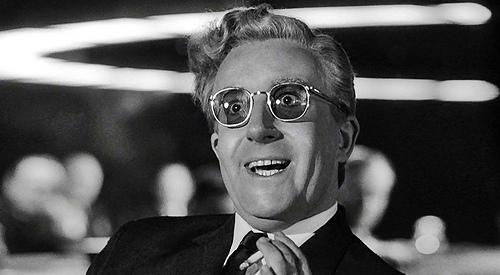
9. Peter Sellers (Dr. Strangelove, 1964)
Lost to Rex Harrison in My Fair Lady
Financiers Columbia Pictures stipulated that, after the success of Kubrick's Lolita, Peter Sellers play at least four major roles in Dr. Strangelove. One, Air Force Major T. J. "King" Kong, fell by the wayside, but Sellers still dominates the screen in three distinctive, brilliant performances: President Muffley's cold, superior attitude makes the straightness with which the satirical dialogue is told both hilarious and chilling; Strangelove's singular absurdity and sharp, jumpy mannerisms are compulsively brilliant; and Mandrake's clipped, proper British tones disguise a suspicious, righteous and fearful soul desperately trying to placate the madness of a global crisis. Rarely has an actor shown in such close proximity how dexterous their approach to performance can be.
-David Upton
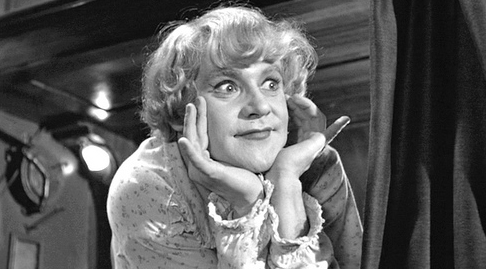
8. Jack Lemmon (Some Like It Hot, 1959)
Lost to Charlton Heston in Ben Hur
Dying is easy. Comedy is hard. But more often than not, Oscar forgets that old adage choosing to reward doom and gloom over an expertly executed one-liner or pratfall. That was certainly the case in 1959, when the Academy decided to bestow that year's Best Actor statue to Charlton Heston's humorless performance in Ben-Hur over one of the greatest comedic performances ever captured on film. Taking what could have easily delved into a tired one-joke gag of a man in a dress, Lemmon, as jazz musician Jerry, hiding out from gangsters in an all-girls band disguised as the vivacious Daphne, is so fully committed that at one point in the film you believe him when he actually has to remind himself that he's not a girl. From his quick-witted banter with fellow drag sister, Tony Curtis, to a hilarious moonlit mambo with Joe E. Brown's randy suitor, Lemmon effortlessly steals the show. (no easy feat when your co-star is Marilyn Monroe at the height of her sex-kitten stardom.) And it all leads up to Lemmon's perfectly timed reaction to what is arguably the all-time best closing line in a Comedy. Nobody's perfect, but Jack Lemmon as Jerry/Daphne sure comes close.
-Andrew Stewart
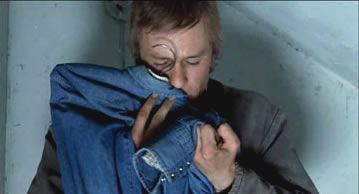
7. Heath Ledger (Brokeback Mountain, 2005)
Lost to Phillip Seymour Hoffman in Capote
In the vast array of great performances, I confined my votes to those I simply could not forget, and I will never forget Ennis del Mar. Ledger did more than give an indelible performance, he gave an illuminating one. I left the theater understanding something about a relationship gone wrong in my own life that I had not before. "Did Ennis remind you of Bob?" I asked a mutual friend. The way he drew himself in. The way his body, as Ennis aged, endeavored to take up less and less space. The way, finally, he could only hold a shirt. It was not just that this was memorable, not just that it was heartbreaking, it was that Ennis showed me a man whom I had never been able to quit, showed him in a way that shed light. To do that is truly gifted, as Heath Ledger was truly gifted.
-Deborah Lipp
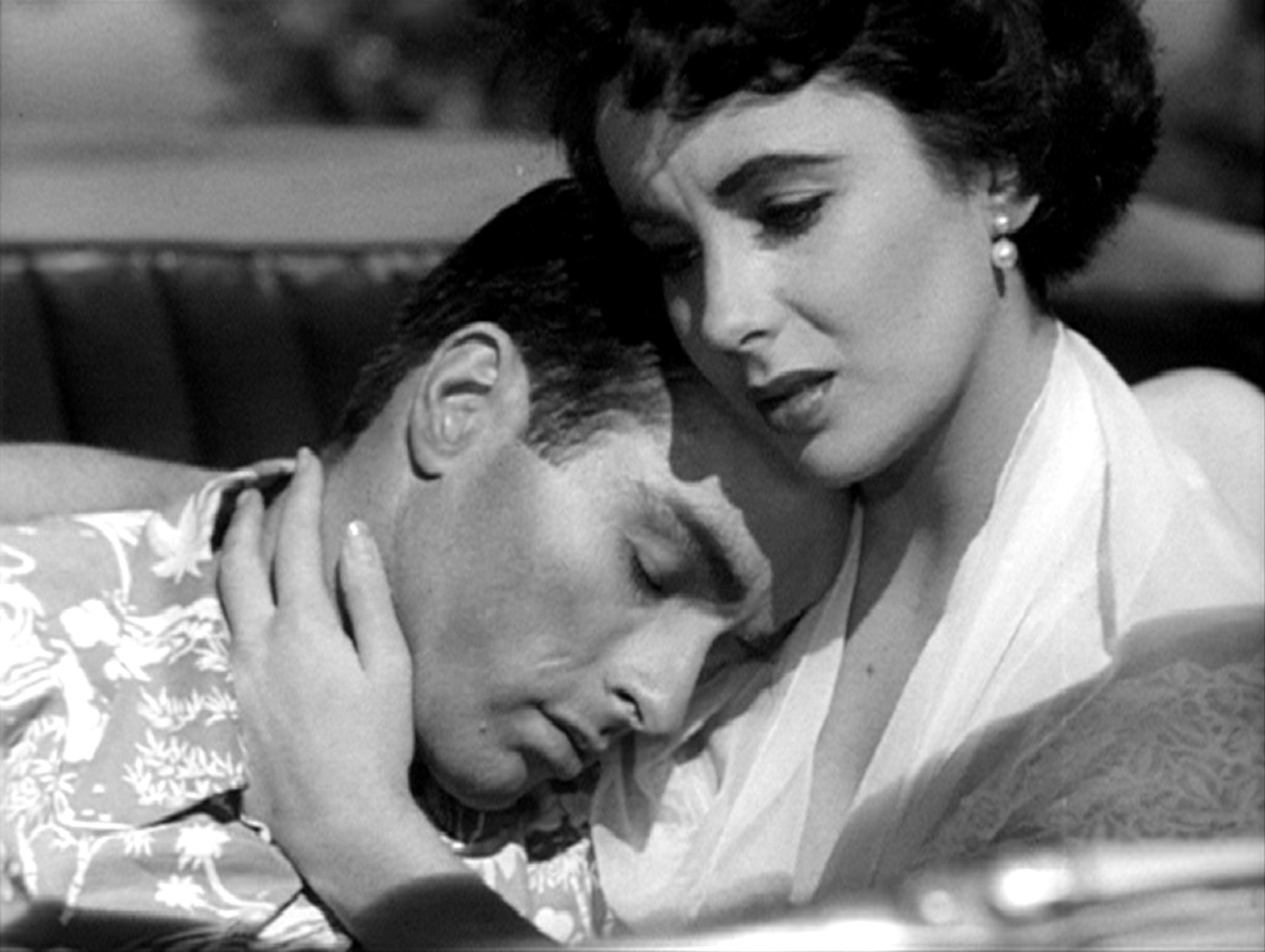
6. Montgomery Clift (A Place in the Sun, 1951)
Lost to Humphrey Bogart in The African Queen
Gloriously captured by William C. Mellor’s enraptured camera, Montgomery Clift’s dazzling beauty and moody intensity were never so transcendent as in A Place in the Sun. But what makes the tragic George Eastman such an indelible creation is the actor’s subtle, insightful blurring of the line between passionate lover and social climber, which constantly challenges the audience’s perception of him and gives George Stevens’ 1951 masterpiece most of its unsettling ambiguity. Whether falling for Elizabeth Taylor’s luminous heiress or hesitating to kill Shelley Winter’s pathetic factory girl, Clift delved into his character’s weaknesses and insecurities like no other Hollywood star before him, thus reshaping the masculine ideal for the postwar generation. Paving the way for the likes of Marlon Brando, James Dean and Paul Newman, Monty Clift’s iconic turn as George Eastman arguably remains the defining male performance of the 50’s.
-Julien Kojfer
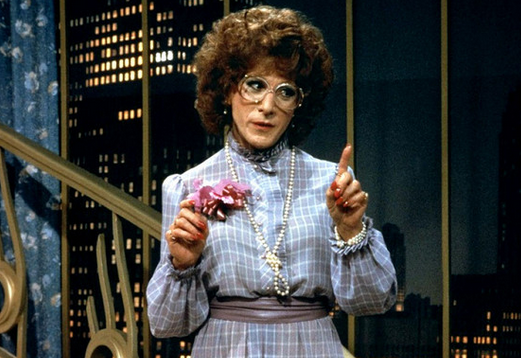
5. Dustin Hoffman (Tootsie, 1982)
Lost to Ben Kingsley in Gandhi
Dustin Hoffman won two Oscars but if I could creatively rewrite history, he'd win both for his greatest performance: One for Michael Dorsey and one for Dorothy Michaels. The beauty of this twinned star turn is in its elaborate cartography. Dustin maps out both Dorothy and Michael with brilliantly precise lines and topography, expertly drawing up the (comic) borders between them and the places where they (dramatically) overlap. Sometimes he does both at once as when you're watching Michael, as Dorothy, looking at a woman with Michael's eyes, while the body language remains pure Dorothy. Hoffman never lets you forget that Dorothy is a (fussy) performance of Michael's that springs from caricature or that Michael himself is more than a little bit of a cliché, a womanizing starving artist actor/waiter. Tootsie was justly appreciated in 1982 as a brilliant movie about gender but it's so much more than a topical moment in its time. It's also a brilliant romantic comedy about the art of acting. My apologies to Jessica Lange but the love affair is between the actor and his creation. That's what makes Tootsie's final scenes so seismic when Michael and Dorothy finally merge by separating, as the mask (read: wig) is dropped. How hard must it be to let your defining role go, just as its finally real to you, to take that final curtain call and move on.
-Nathaniel R
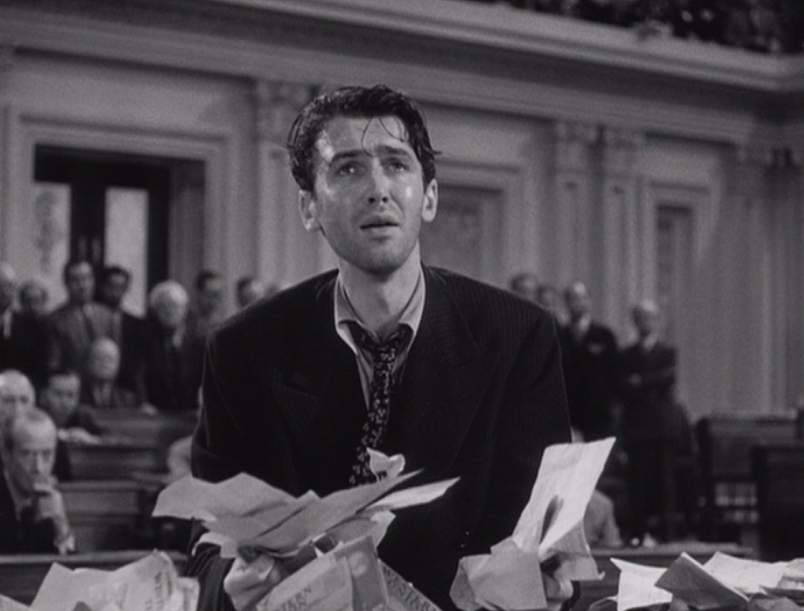
4. James Stewart (Mr. Smith Goes to Washington, 1939)
Lost to Robert Donat in Goodbye Mr Chips
Frank Capra saved his best characters for Jimmy Stewart. You can see Stewart's mighty endurance and versatility in Mr. Smith Goes to Washington, a great performance that stands out even in a year as crowded as 1939. It shows Stewart's persona as the middle-American lanky man child managing to be the only actor dead or alive who fits in with a bunch of boy rangers. It takes a lot of shamelessness to imitate bird calls for millions to see on the silver screen. It also shows the other side of the thespian, strong enough to sweat through a whole day of filibustering to convince a legislative body not to turn a local campsite into a dam. Stewart takes advantage of his physical persona to trick his audience into thinking that he might lose, then helps us rejoice when the little man like him wins.
-Paolo Kagaoan
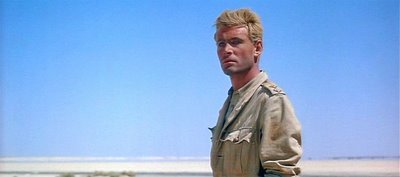
3. Peter O’Toole (Lawrence of Arabia, 1962)
Lost to Gregory Peck in To Kill a Mockingbird
Lawrence of Arabia is a paradox: it is a large epic about a legend and a war, but it is also a character study of the man who built the legend. In order for this to work, the actor playing T.E. Lawrence had to be larger than the four-and-a-half long CinemaScope movie itself. Peter O'Toole fills every vast, unending inch of desert in the 70mm frame with the sheer intensity of his performance. O'Toole's dashing good looks and romantic British drawl are offset by his terrifyingly blue eyes - I say "terrifyingly" because there's always a hint of madness behind them. As Lawrence, he's always too little and too much - a man uncomfortable in a drab army uniform who swells to fit his white savior's robes. Lawrence is not a Good Man, but he makes himself a Great Man, and O'Toole embodies egomania and charisma required to be Great. It's possible to argue that Peter O'Toole's first leading role and first Oscar nomination was his best role. Certainly, it set a precedent for O'Toole to continue to be nominated (and lose - eight times total!) for playing madmen. Peter O'Toole role as Lawrence remains an explosive introduction to Oscars history.
-Anne Kelly
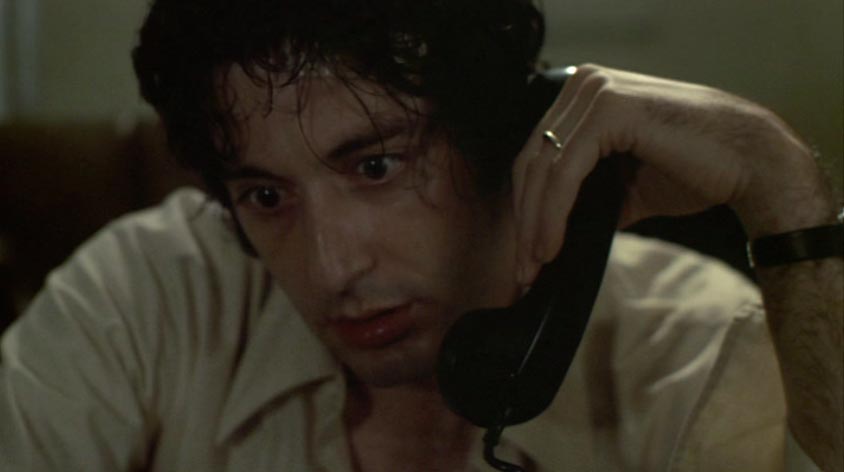
2. Al Pacino (Dog Day Afternoon, 1975)
Lost to Jack Nicholson in One Flew Over the Cuckoo's Nest
These days Pacino is most associated with the over-the-top hamminess of his post-Scent of a Woman shout-acting, but the truth is Al was going for the gusto since back in ’75 when he starred in Lumet’s Dog Day Afternoon. It’s just that in those days he backed up his performance with a live-wire conviction that sold every bold choice and grand gesture. As the bank robber growing unhinged over the course of a stickup gone disastrously wrong, Pacino plays Sonny as a compulsive people pleaser struggling to placate everyone as the situation unravels, his eyes screaming with desperation even as he summons the lunatic will to plow forward. When Sonny lets loose with his famous cries of “Attica!” the thrill isn’t just one of defiance, but of a man who is in control of a situation for the first time in what must be ages.
-Michael Cusumano
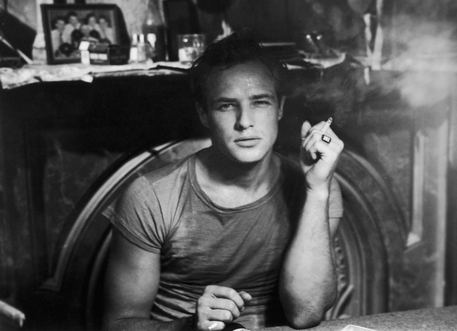
1. Marlon Brando (A Streetcar Named Desire, 1951)
Lost to Humphrey Bogart in The African Queen
Many performances are good. Some are great. A precious few are truly iconic. Marlon Brando's Stanley Kowalski in Elia Kazan's A Streetcar Named Desire is one of those few. Exuding easy manly sex appeal from his very first second onscreen, it's easy to sympathize with Vivien Leigh's Blanche DuBois as she looks at him with the eyes of a hungry cat. But it's more than just sex that Brando brings to the role. Stanley is one of the most vulnerable and volatile men Tennessee Williams ever wrote, and Brando gets that his brutishness covers up the fact he needs Stella's love on a deeper level than he knows how to express. Stanley may be a simple man, but in Brando's hands, he's never less than a fully-rounded human being - a man with desires and a code that he protects just as fiercely, and with more physical force, as Blanche does hers. Brando's Stanley is perfectly life-size, a man who alternately inspires terror, pity, and devotion not just from the women in his life, but from the audience.
Roger Ebert wasn't joking around when he said that Brando's performance had more impact on screen acting than any other. Streetcar, and Brando's performance within it, upped the ante. To prove it, the film deservedly won three of the four acting Oscars in 1951 - the first of only two films in history to do so. But the monumental performance Brando gives here should have made it four.
-Daniel Bayer

WHAT DO YOU MAKE OF OUR LIST and what's yours like?
(Thursday we'll share memorable also rans and trivia)